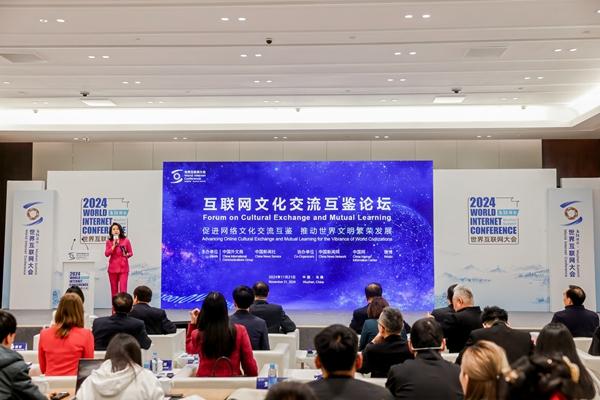The Forum on Cultural Exchange and Mutual Learning is held in Wuzhen, Zhejiang province, Nov. 21, 2024. [Photo provided to China.org.cn] A forum focusing on advancing online cultural exchange and mutual learning for the vibrance of world civilizations took place on Nov. 21 in the ancient water town of Wuzhen, east China's Zhejiang province. The event was part of the 2024 World Internet Conference (WIC) Wuzhen Summit. Hosted by China International Communications Group and China News Service, the Forum on Cultural Exchange and Mutual Learning brought together experts, scholars, digital creators, and representatives from internet enterprises. Discussions centered on leveraging the internet as a bridge for cultural dialogue and contributing to the advancement of human civilization. David Gosset, founder of the Europe-China Forum and initiator of the China-Europe-America Global Initiative, emphasized the internet's ability to deepen dialogue and understanding among diverse cultures. He advocated for an inclusive, human-centric approach that extends the benefits of the internet to more people worldwide. Zhu Dianjun, editor-in-chief and vice president of public policy at Tencent, underscored the intersection of technology and culture. "Culture brings warmth to technology, technology expands culture's reach, and exchanges illuminate civilization," he remarked. Zhu pointed out how new digital cultural forms are emerging as effective bridges for introducing Chinese culture globally, particularly resonating with younger audiences. The forum also showcased innovative methods of cultural exchange. Richard H. Sears, an American scholar and founder of the Chinese Etymology website, discussed his efforts to digitize ancient Chinese characters. His platform, which features a database of 100,000 characters including oracle bone and seal script, as well as traditional and simplified characters, enables users to explore the long historical evolution of written Chinese. He noted the growing interest among foreigners in learning Chinese and its dialects, and his hope to remain a part of this expanding story. Fang Jinlong, a well-known pipa musician, shared how the internet has helped him popularize traditional Chinese music. His 2018 viral videos showcased performances on a modern five-string pipa blending global styles. Fang now uses digital platforms to share stories of ancient Chinese instruments, including the bone flute, reed pipe and pipa, aiming to take Chinese music to greater heights. Malaysian-Chinese singer Azora Chin underscored music's ability to bridge cultures. Through his melodies, Chin seeks to connect Malaysian and Chinese traditions, reflecting the depth and diversity of Chinese cultural heritage. Tian Haibo, producer of the "Mortise & Tenon" game, highlighted video games as effective cultural storytelling tools. He described games as accessible, interactive mediums ideal for introducing Chinese traditions to global audiences. Chen Lina, vice president and editor-in-chief of Weibo Government and Media Affairs, emphasized social media's expanding influence in cultural exchange. She also noted its value in fostering international dialogue, strengthening people-to-people connections, and presenting Chinese culture on the global stage. Thai-born influencer Apinya Charunpumhiran shared her experience as a digital communicator for Chinese culture. By presenting innovations like autonomous taxis and AI avatars to her international followers, she is helping reshape perceptions of China, portraying it as a futuristic and dynamic society. The forum concluded with the release of the 2024 Annual Report on the Chinese Cultural Symbols International Communication Index (CSIC). The report analyzed the global dissemination of Chinese cultural symbols across six dimensions: architectural art, classical mythology, intangible cultural heritage, fantasy genres, cuisine, as well as natural and cultural landscapes. The findings offer valuable insights for enhancing the global reach of Chinese culture.
Wuzhen forum promotes online cultural exchanges
Editor:谭婕倪
Source:china.org
Updated:2024-11-24 18:12:27
Source:china.org
Updated:2024-11-24 18:12:27
Special
Contact
Welcome to English Channel! Any suggestion, welcome.Tel:0731-82965627
lisl@rednet.cn
zhouqian@rednet.cn











